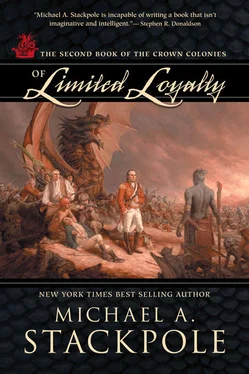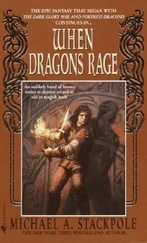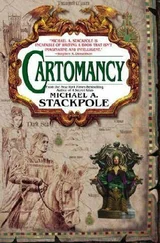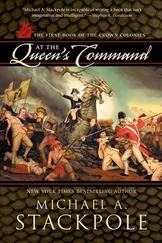Michael Stackpole - Of Limited Loyalty
Здесь есть возможность читать онлайн «Michael Stackpole - Of Limited Loyalty» весь текст электронной книги совершенно бесплатно (целиком полную версию без сокращений). В некоторых случаях можно слушать аудио, скачать через торрент в формате fb2 и присутствует краткое содержание. Жанр: Фэнтези, на английском языке. Описание произведения, (предисловие) а так же отзывы посетителей доступны на портале библиотеки ЛибКат.
- Название:Of Limited Loyalty
- Автор:
- Жанр:
- Год:неизвестен
- ISBN:нет данных
- Рейтинг книги:4 / 5. Голосов: 1
-
Избранное:Добавить в избранное
- Отзывы:
-
Ваша оценка:
- 80
- 1
- 2
- 3
- 4
- 5
Of Limited Loyalty: краткое содержание, описание и аннотация
Предлагаем к чтению аннотацию, описание, краткое содержание или предисловие (зависит от того, что написал сам автор книги «Of Limited Loyalty»). Если вы не нашли необходимую информацию о книге — напишите в комментариях, мы постараемся отыскать её.
Of Limited Loyalty — читать онлайн бесплатно полную книгу (весь текст) целиком
Ниже представлен текст книги, разбитый по страницам. Система сохранения места последней прочитанной страницы, позволяет с удобством читать онлайн бесплатно книгу «Of Limited Loyalty», без необходимости каждый раз заново искать на чём Вы остановились. Поставьте закладку, и сможете в любой момент перейти на страницу, на которой закончили чтение.
Интервал:
Закладка:
The only thing the Prince did not like about the flight training was that he had no parameters for knowing how much dragons flew or pretty much anything else about the demands this would be making on Mugwump. The thing that troubled him the most was that Mugwump appeared to tolerate directions, but really didn’t enjoy them. The dragon had never given him a glance that suggested he was thinking of just devouring the Prince-more of a look that said, “I know what I’m doing,” which reflected a bit more annoyance than amusement.
Prince Vlad generally ended training sessions shortly after such looks. Mugwump was content to eat his fill and sleep for a long time after his flights. Not only did this give the Prince a chance to recover from his own aches and pains, but to work on his second problem-the problem that had sent a chill through him.
Bishop Bumble had sadly reported that none of the missives from Ephraim Fox survived. Within twelve hours of that message being delivered, however, a burlap satchel full letters and manuscripts appeared on the Frosts’ doorstep. Dr. Frost had brought them to the Prince, and Vlad had retreated to his laboratory to study them.
They were remarkable in two ways. First, Ephraim Fox, or Ezekiel Fire as he had begun to call himself when he created the True Oriental Church of the Lord, had done an incredible job of cataloguing plants and animals in Mystria. The details he provided on each rivaled those recorded by the most careful of Tharyngian naturalists. His early work referenced some of their work and referenced journals that he appeared to have made of his observations of natural phenomena while studying in Norisle. Had the Prince known of the man and his passion for precision, he’d have hired him to travel with Nathaniel on expeditions.
Unfortunately, as brilliant as the observations were, the conclusions drawn from them were utterly and completely insane. Right next to a traced outline of a leaf, onto which had been drawn the veins and to which had been added a host of critical details, would be a long list of Scriptural references. Some clearly related to the ratios of leaf length to width, or the number of ribs and veins, or the number of points or petals on a flower. Others were abstracted through more arcane formulae, most of which the Prince could not intuit. The Norisle journals appeared to be the key to deciphering some of the material.
Prince Vlad tucked himself into Ezekiel Fire’s world so deeply he began to see things through the man’s eyes. He pulled out his own journals to double-check the man’s observations. He crawled around outside, looking for new samples which he could measure and test against Fire’s work. Before very long, Vlad began to see patterns in nature-very much the same patterns Fire did.
And, unfortunately, he saw more.
It all boiled down to the question of whether or not magick had predated the ability of men to read and write. Clearly it had. Illiterate men like Nathaniel Woods could be taught to use magick, so reading and writing were not necessary, but an ability to reason was. Prince Vlad’s initial instructions in magick had involved reading the formula for a spell, memorizing it, transforming it into a symbol or concept, and then invoking that concept. His instructor had mentioned, for example, that some men think of a torch when igniting brimstone, and others the sun. That symbolic representation allowed them to focus magickal energy for the desired result.
As a teaching method, that made sense, but it didn’t point out how preliterate people learned that they could access magick or how they trained themselves to focus it. One of the basic laws of magick, the Law of Sympathy, suggested that like objects could have a similar effect on a target. In preparing medicines for the heart, the foxglove, because of its heart-shaped blossom, was considered extremely valuable. Such linkages would have been obvious to the preliterate. In fact, as Fire had appeared to discover, many of the measurements in nature encouraged abstraction, which generated a symbol, upon which focus could be devoted to attain a desired magickal result. The idea, then, that early magicians had learned how to do magick based on things they saw in nature, made perfect sense.
Where Fire pushed it further was that he linked these measurements to scattered Scriptural verses. When Prince Vlad began playing with them, pulling them together and ordering the sentences, he immediately noticed two things. First, the words had the same sort of rhythm and cadence as offered in spell formulations. Second, and this had taken closer reading, the verses differed from the original Achean and Phaonaean verses. They were not so different as to be wholly incorrect, but the use of unsuitable or inexact synonyms for the original words made the translation more difficult than it needed to be.
Which made no sense. Prince Vlad sighed. It made no sense unless an entrenched group of magickers within the Church of Norisle had conspired with King Robert in creating his version of the Good Book. It seemed so monstrous and yet elegant a plan that Vlad did not know whether to be horrified or pleased with the work done by his ancestor. It appeared that the Church might have turned the Good Book into a grimoire. This put the key to magickal power into the hands of everyone, since the book had been printed and widely distributed. As primitive as Mystria was, Vlad doubted there was a village where at least one copy of the Good Book couldn’t be found, and many were the families who cherished their own heirloom copies.
He rubbed his eyes. How often had he seen the sign in the cathedral, where Bishop Bumble had posted a list of Scriptures to be read and contemplated during the week? His sermons were liberally sprinkled with Scriptural references-some of which made no sense to Vlad, and now he understood why. The printed version of those same sermons often included footnotes that referenced yet other passages.
Anyone who knew the key to deciphering the verses could learn new magicks. The Church had, in essence, adopted the same sort of book-based code that the Prince shared with his father and with Owen, but in this case the key was also the message. And since books and verses were independent of page counts, any Good Book, big or small, in multiple volumes, would serve, provided it faithfully reproduced the King Robert Version text.
It seemed clear from Fire’s writing that he felt his discovery of these spells within Scripture were confirmation of God’s hand in their original transcription and in the KRV translation. Prince Vlad had no difficulty seeing the Church having a different reaction-primarily one of panic to learn that a madman had somehow cracked their code. This meant that anyone who learned it could use their grimoire, even Tharyngians. And some Church officials must have seen the even greater ramifications of Fire’s work. He’d discovered the key by looking at nature, which meant anyone could rediscover the key.
Vlad shivered. The implications of all that were beyond his ability to fully comprehend. He wondered, however, if basic magick principles worked in ways he’d not considered before. The Law of Sympathy, for example, or the Law of Contagion. Could the Church use a person of a certain bloodline to control others in that bloodline? The Church encouraged-and often selected-members of noble families to enter its ranks. Vlad had seen that as a measure the nobility had taken to guarantee that the Church would not betray political leaders, but what if it was reversed? What if his father, for example, was a means through which King Richard could be controlled? And not just because he might be a hostage, but through some sorcerous influence that Prince John might not even understand. What if my father’s prayers for his brother constituted a formula through which the King was magically controlled?
Читать дальшеИнтервал:
Закладка:
Похожие книги на «Of Limited Loyalty»
Представляем Вашему вниманию похожие книги на «Of Limited Loyalty» списком для выбора. Мы отобрали схожую по названию и смыслу литературу в надежде предоставить читателям больше вариантов отыскать новые, интересные, ещё непрочитанные произведения.
Обсуждение, отзывы о книге «Of Limited Loyalty» и просто собственные мнения читателей. Оставьте ваши комментарии, напишите, что Вы думаете о произведении, его смысле или главных героях. Укажите что конкретно понравилось, а что нет, и почему Вы так считаете.












